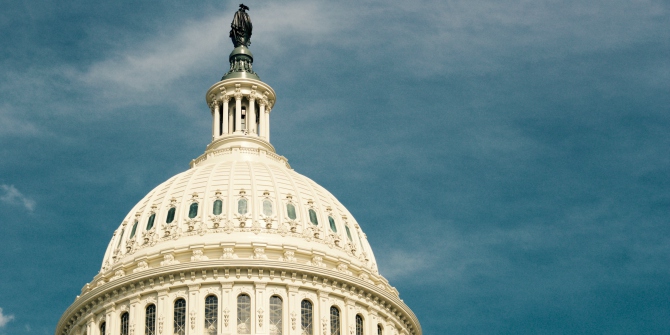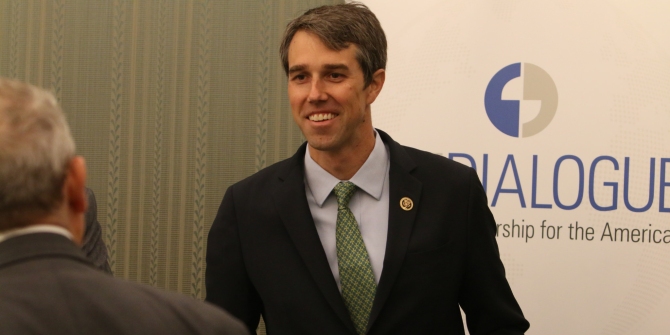 What can Vice Presidential nominee Kamala Harris’ speech at the Democratic National Convention in August tell us about how she will campaign heading into the November presidential election? Emilia Belknap writes that Harris’ speech gave insights into how she views the American family and discusses how Harris has picked up familiar gendered themes since her presidential campaign. Additionally, Belknap discusses how President Donald Trump has picked up stereotypes with which to attack her. However, with police brutality and violence against Black Americans spurring calls to defund the police, Harris needs to focus on shedding her label as a ‘Top Cop’ to win the votes of left-leaning Democrats this November.
What can Vice Presidential nominee Kamala Harris’ speech at the Democratic National Convention in August tell us about how she will campaign heading into the November presidential election? Emilia Belknap writes that Harris’ speech gave insights into how she views the American family and discusses how Harris has picked up familiar gendered themes since her presidential campaign. Additionally, Belknap discusses how President Donald Trump has picked up stereotypes with which to attack her. However, with police brutality and violence against Black Americans spurring calls to defund the police, Harris needs to focus on shedding her label as a ‘Top Cop’ to win the votes of left-leaning Democrats this November.
- This article is part of our Primary Primers series curated by Rob Ledger (Frankfurt Goethe University) and Peter Finn (Kingston University). Ahead of the 2020 election, this series explores key themes, ideas, concepts, procedures and events that shape, affect and define the US presidential primary process. If you are interested in contributing to the series contact Rob Ledger (ledger@em.uni-frankfurt.de) or Peter Finn (p.finn@kingston.ac.uk).
As the 2020 Democratic National Convention (DNC) came to a close on 19 August, viewers saw the Democratic Presidential Nominee Joe Biden formally announce California Senator Kamala Harris as his Vice-Presidential candidate. Harris’ Vice Presidential nomination was not a surprise as Biden had previously promised to choose a woman as his running mate. With Biden’s promise in the background and the #BlackLivesMatter movement keeping racial justice in the foreground, Harris could seem like the obvious choice, on paper at least, to represent many Americans concerned with inequality as she is a mixed African and South Asian American woman who is highly qualified for the job.
Harris’ past as a prosecutor first as San Francisco’s District Attorney, and then as California’s Attorney General, however, is complicated and in her own words ‘America has a deep and dark history of people using the power of the prosecutor as an instrument of injustice.’ Harris’ speech and performance at the DNC foreshadow not only what we can expect from her but also how Trump may attack her in the coming months. Reacting to Trump, Harris stated she knew a predator when she saw one and that she and Biden expect to get ‘the predator’ out (of the White House) – even if it means pandering to moderate conservatives.
Beyond Trump, reactions to Harris’ nomination has been mixed. Some saw her nomination as a big step forward for US politics, whilst some academics and activists believe her background as a ‘Top Cop’ is problematic at a time when calls for criminal justice and gun reform have grown louder. Countering this, others have urged a more realpolitik reading, arguing such critics are ‘ignoring how politics works.’
‘Momala’ and the Focus on Fighting for the American Family
Last year, Kamala Harris alongside Tulsi Gabbard, Kirsten Gillibrand, Amy Klobuchar, Elizabeth Warren and Marianne Williamson announced their bids as candidates in the 2020 presidential primaries – setting a new record for the most women candidates running for the White House. In their campaign videos, Warren, Gillibrand, and Klobuchar spoke to the public from inside their living rooms or from a kitchen counter including photos of themselves with their families. While these tropes may be subtle, scholars have argued that when women are running for leadership positions they must contend with gendered stereotypes on what a leader ‘looks like’ and assumptions of who is ‘fit’ to lead. For decades, the Republican Party has often focused on promoting ‘traditional family values’ at conventions and in campaigns. Women leaders, no matter the party, are often expected to fill their roles in political positions based on stereotypical perceptions of women and femininity as mothers, caretakers and home-makers.
By contrast, in Harris’ presidential campaign video, she was shown in front of an American flag with photos of her speaking to audiences at rallies or from behind a podium. At the DNC, however, audiences got a closer look into Harris’ story as her speech centred on themes of family, motherhood and generations of women supporting women. Harris took viewers through her life beginning with the activism of her immigrant parents who met at a Civil Rights protest in the 1960s through to her South Indian mother being the primary provider for her and her sister. Harris stated that her mother raised them to be ‘proud, strong Black women’, and described how her mother taught her the importance of putting ‘family first’ – the one you are born into and the family you choose.

“Announcement of Senator Kamala Harris as Candidate for Vice President of the United States – Wilmington, DE – August 12, 2020” by Joe Biden is licensed under CC BY NC SA 2.0.
Harris’ speech also spoke to a major theme of the 2020 DNC – the roles that women play when they are supporting each other both in the ‘private’ sphere of the family and in the more ‘public’ sphere of politics. Marking herself out, however, Harris acknowledged that the broader concept of ‘family’ goes beyond Western and stereotypical understandings. Notably different from her campaign video, Harris told us her step-children call her ‘Momala’ and lists all those she considers family – friends, sorority sisters, classmates, chitthis (the Tamil word for maternal aunt), a neighbour, and more. Harris’ argued that throughout her political career she has cared, protected and fought ‘for the people’ of America much like a parent would for their children and evoked images of the American people being part of a large extended family. In short, Biden and Harris portrayed themselves as leaders who are standing up for the ‘new’ representative American family and a future their ‘parents and grandparents fought for.’
In the short film premiered at the DNC, ‘America Rising: Women’s Suffrage to Women’s March’ there were homages to women activists and politicians that echoed the words of Harris’ mother, urging viewers ‘the fight for justice is a shared responsibility.’ Again, the DNC’s major themes of women’s power, motherhood and family were present. The film prominently featured mothers and grandmothers protesting, with Trayvon Martin’s mother, Sabryna Fulton, advocating for stricter gun control. The inclusion of Fulton, however, was crucial as the #BlackLivesMatter movement was founded seven years ago as a result of the tragic death of her son. While themes of women’s political power and family were centred at the DNC, Fulton’s presence in the short film served as a reminder that there were still many questions left unanswered by Harris and Biden in regards to their views on police and criminal justice reform as well as policies that would fight systemic racism in America. At the DNC Harris proved that she fit the bill in terms of representation, but Harris has yet to show voters that she is indeed the ‘progressive prosecutor’ she claims to be by taking calls for policing reform seriously and to show that her views on criminal justice are shifting farther left.
Trump: ‘Nasty’ Women & Twitter Fingers
Trump live-tweeted the Democratic convention and described Harris as ‘angry,’ ‘mad,’ ‘a liar,’ and ‘nasty’, arguably leaning into the ‘angry black woman’ stereotype often used to diminish the ambitions and assertions of power by Black women and women of colour. When asked about Trump’s tweets in their first joint TV interview, Biden and Harris explained it as a distraction from the negligence and harm he causes to Americans. More analytically, this depiction echoes the analysis of writer Tamara Winfrey Harris (no relation to the Vice Presidential nominee) who, in her 2015 book The Sisters Are Alright: Changing the Broken Narrative of Black Women in America, argues such depictions are rooted in slavery wherein stereotypes of Black women were ‘key to maintaining [their] subordination’ and ‘provided a counterbalance to the identities of middle-class and wealthy white women, who had been placed on a pedestal as perfect illustrations of femininity…and in need of protection’.
Trump’s recent statements reveal his views of American women voters as being either the ‘suburban housewife’ who he is sure will vote for him or the ‘nasty woman’ who won’t. Arguably, this label of the ‘suburban housewife’ could have been used to target white women voters who predominantly voted for him in 2016 and fuel white racist fears about integration efforts in neighbourhoods to further bolster support for his renewed candidacy. In the lead up to the November election, we can expect more name-calling and frantic Twitter behaviour from Trump.
Kamala Harris: Still a Top Cop or a Progressive Prosecutor?
Biden’s choice of Harris is both strategic and safe but overall a win for how Americans are represented in politics. A recent online survey stated that 59 per cent of African American women ‘would be more enthusiastic’ in voting for Biden if he chose an African American woman as his running mate. This is crucial as Black women have consistently proved themselves to be the most reliable voting bloc in the US and have historically shown consistent support to the Democratic Party. However, Black women are not single-issue voters and do not vote only to advance the agenda of the Democratic Party. With a recent report showing ‘Criminal Justice/Policing Reform’ and ‘Hate Crimes/Racism’ as the top issues for Black women in America, Harris is going to need to prove to Black women voters that she is moving away from her brand as a ‘Top Cop’ who has been accused of avoiding intervening in cases involving police killings. With the far left of the Democratic Party finding Biden and Harris ‘too centrist’ and with more conservative Democrats finding them ‘too progressive,’ opinions on the Democratic duo are contradictory and Biden and Harris have much to prove in the months leading up to November. However, the one unifier from the Democratic National Convention was certain: Trump has got to go.
Please read our comments policy before commenting.
Note: This article gives the views of the author, and not the position of USAPP – American Politics and Policy, nor the London School of Economics.
Shortened URL for this post: https://bit.ly/2RWEz4o
About the author
 Emilia Belknap – The University of Edinburgh
Emilia Belknap – The University of Edinburgh
Emilia Belknap is a PhD candidate in Gender & Politics at the University of Edinburgh investigating voting behaviour, gender gaps and constitutional change.






